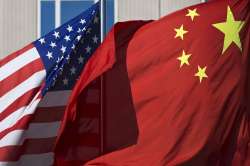US-China decision to not impose higher tariffs de-escalates hostilities temporarily: Moody's
Moody's Investors Service Managing Director, Sovereign Risk Group, Marie Diron said the US-China relations will remain contentious as the US and China are too strong to cede their respective national interests in negotiations with each other.

The US and China agreeing to put off imposition of higher tariffs temporarily de-escalates hostilities between the two nations, but will not bridge the wide gulf between their economic, political and strategic interests, Moody's said on Monday.
Moody's Investors Service Managing Director, Sovereign Risk Group, Marie Diron said the US-China relations will remain contentious as the US and China are too strong to cede their respective national interests in negotiations with each other.
In a meeting between US President Donald Trump and his Chinese counterpart Xi Jinping on the sidelines of the annual G-20 Summit in Argentina, Trump agreed to postpone for 90 days a scheduled increase in tariffs on USD 200 billion in Chinese imports, while Xi agreed to purchase a very substantial amount of US products so as to reduce the USD 375 billion trade deficit between the two countries.
Signalling an end to the six-month-long trade war, Trump agreed that on January 1, 2019, he will leave the tariffs on USD 200 billion worth of product at the 10 per cent rate, and not raise it to 25 per cent at this time.
"The announcement following the G20 meetings temporarily de-escalates hostilities between the US and China. However, we expect US-China relations to remain contentious. Narrow agreements and modest concessions in their ongoing trade dispute will not bridge the wide gulf between their respective economic, political and strategic interests," Diron said.
The US and China, being the world's two largest economies, are too strong to cede their respective national interests in negotiations with each other.
"However, an economic cold war that leads to decoupling would be costly for both countries, owing to their deep links with each other. Therefore, relations between the two powers will swing between conflict and compromise," Diron said.
She said the tensions between the US and China will affect global credit conditions in four key areas-- trade, technology, investment and geopolitics.
Continued tensions would disrupt global trade, erode the effectiveness of the multilateral international trade regime and dampen growth. As every new development is reflected in financial markets, it will affect valuations and borrowing costs for many debt issuers, she added.
"At the sovereign level, we are watching growth, investment and policy responses along with confidence indicators, such as capital flows and exchange rates,"Diron said.
According to Diron, the Asian economies that are deeply integrated in regional and global tech and trade chains, including Hong Kong, Korea, Malaysia, Singapore, Taiwan and Vietnam, are most exposed to significant and lasting disruptions to trade and investment.